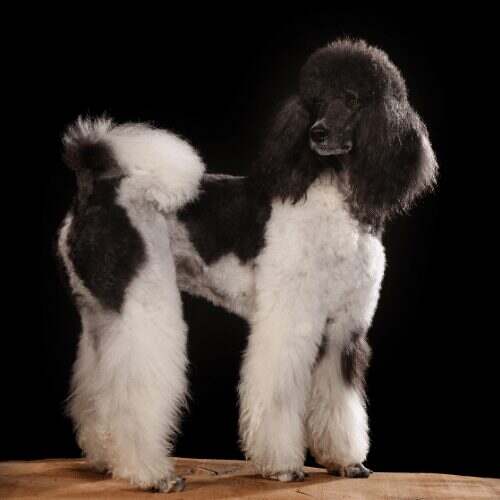Introduction to Poodles
Merle Poodles Pardi have become one of the most favorite dog breeds in the world, receiving all-around acclaim for their intelligence and versality as well as elegance. The Poodle breed originated in Germany where they were bred in order to be used in water retrieval due to their swimming abilities as well as their keen sense of smell. The same characteristics and charm have been retained in the three sizes—the Standard, Miniature, and Toy.

About the Merle Coat Pattern
A merle coat pattern is a mottled or marbled appearance. This occurs due to some special genetic variation that controls pigment distribution in a dog’s fur. The colors vary from blue, red, chocolate, and black, which appear along with some lighter patches and swirls, creating that unique mark on every individual dog..
The Pardi Merle Pattern
The pardi pattern always manifests itself with a basic color, black or brown, over which the merle pattern is superimposed, producing quite nice contrast that shows a beautiful capability of Poodle. Since this goes together with all other merle patterns, the pardi coloration can be quite disparate from dogs with pronounced marbling towards less apparant, more discreet presentation.
Health Issues in Merle-Poodles
While the merle pattern might be appealing, breeding for this trait requires a lot of concern with health implications. In the breeding of two merle dogs, there could come the likelihood of producing what is termed as “double merles,” which then exposes them to various health problems among them the following:
- Hearing Loss: Double merles will likely suffer from deafness. This ranges from partial deafness to complete loss of hearing.
- Eye Problems: These dogs may be vulnerable to certain eye problems like cataracts, retinal dysplasia, and other related vision disorders.
- Skin Disorders: Certain merle dogs experience skin issues resulting from problems in pigmentation; these make the dogs even more susceptible to sunburn and most of the diseases related to the dermis.
Finding a Responsible Breeder
- Research : Find breeders who are knowledgeable about the breed and genetics of the merle color. Ask them to explain their breedings and the health testing that has been done.
- Health Testing: Find breeders who do all the health testing on both parents. Look for clearances regarding hip and eye issues and other breed-specific concerns.
- Visit the Breeder: If possible, visit the breeder’s facility to see the living conditions of the dogs. Healthy, well-cared-for dogs are a good indication of a responsible breeder.
- References: Ask for references from previous customers. Speaking to others who have purchased puppies from the breeder can give you a good insight into what kind of temperament and health expect in your dog.
Merle Poodle Grooming
Merle Poodles require proper and personalized grooming. The unique coat of the merle Poodle demands regular attention to maintain the coat healthy as well as look its best. Here are some grooming tips:
- Brushing: Brush the coat of your Poodle every week to avoid matting and tangling.
- Bathing: Bathe your Poodle every 4-6 weeks, or as needed.
- Professional Grooming: Many owners take their Poodles to the professional groomer every 6-8 weeks.
- Ear Care: Since Poodles have drooping ears, moisture and debris get trapped and must regularly be cleaned out to avoid developing infections.
- Trimming of Nails: Trimming of Poodle’s nails should be done regularly to avoid discomfort and mobility problems. Overgrown nails will give your Poodle walking problems since it is painful for your dog .
Merle Poodle Owner Lifestyle
- Outdoor recreations: Make use of the local parks or trails available for hiking or even the beach. These dogs truly love their life outside, and their good swimming abilities make the waters a must.
- Dog Parks: A dog park is a perfect place for socialization, which means leaving your Poodle alone in the presence of other animals and adults so that it can learn some basic social skills.
- Agility and Obedience Training Engage in agility training or participate in obedience competitions. Poodles are agile and love a physical and mental challenge.
Conclusion
They are really a lot to look at and make great additions to the family of Poodles, especially the Merle Poodle with its beautiful pardi coat pattern. And because they put beauty, smartness with funniness together, they make excellent family and companion animals for anyone. However, it also should be done and kept with responsibility in breeding and ownership and mindful of the potential risks of health issues that may come with the merle gene.

